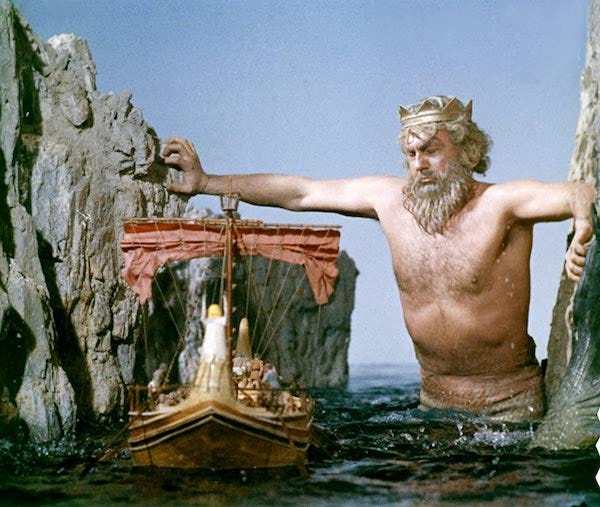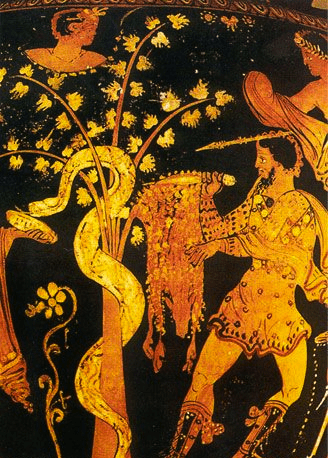Imagine a group of superheroes, each with their own special power, traveling around on wild, improbable adventures. There is the guy who can fly, another with super strength and yet another fellow with a secret, unbeatable weapon. And of course there is also the captain of the team, usually an “all around good guy” who’s almost an everyman… if it wasn’t for his quick-witted thinking and problem solving.
This is the Argonauts, a fantastic ancient Greek gang, complete with a cool name and trusty boat to speed them on their way.
The main man leading the group is Jason. In his cadre of killers are famous myth makers such as the Boreads (sons of Boreas, the North Wind) who could fly, Heracles, Philoctetes, Peleus, Telamon, Orpheus, Castor and Pollux, Atalanta, and Euphemus.
Their mission? To help Jason take his rightful place as king. To accomplish this quest, however, the band of heroes must fetch the golden fleece…. which is hung from a tree in the grove of the Colchian Ares, guarded night and day by a dragon that never sleeps.
Back up a minute.. you might say. A golden fleece? A displaced price? A fire breathing dragon? How did this all happen in the first place? How did our greek myth get to this fantastic junction point, filled with monsters, martyrs and missions?
It began, like many great stories, with a power struggle. Not pleased at being second to the throne, our stereotypical baddie, Pelias, killed his half-brother and rightful king, Aeson. Not only that, Pelias murdered all of Aeson’s descendents to be rid of his competition.
After the familial slaughtering, Pelias was still worried that one day he would be overthrown. He consulted with an oracle to be certain and was dismayed at the news: Be wary of the man with one sandal.
Unfortunately for Pelias, the oracle was right. Aeson’s infant son, Jason, miraculously survived.
When the executions began, Jason’s mother ordered the women to cluster around the baby and cry as if he was still-born. Thus they successfully deceived the wrathful uncle that he was not alive. Afterwards she sent Jason away to be educated with the centaur Chiron, knowing his life would be in danger if Pelias found out the truth.
Jason grew up to be a strong, capable man who was determined to return to his hometown and take back his rightful throne.
One day Pelias decided to throw a few games in honor of his alleged father, the god Poseidon. This was the perfect opportunity for Jason to visit. On the way, he crossed a river to help an old woman (who, fantastically enough, was the goddess Hera) and he lost his shoe. When Jason was announced as the man with one sandal, the fearful uncle knew the time had come. Pelias could not kill his nephew, however, in front of all the gathered kings and spectators, so he sent Jason on a misson, one he thought was impossible to accomplish…
He told Jason this: “To take my throne, which you shall, you must go on a quest to find the Golden Fleece.” Jason happily accepted.
Jason then assembled his super team of monster vanquishing men, and embarked in their famous ship, the Argo. Their first stop? The island of Lemnos, known for the foul smelling, men-killing women who inhabit the place.
And so, the myth of Jason and the Argonauts began…







I'm not pretentious enough to consider myself an expert on the classical world. Like many, I read the classics in high school or college, which sparked an interest, but that interest waned as I engaged in business and went about dealing with life. Now that I am retired, with more free time to renew my interest in the classics, I'm happy to have found Classical Wisdom as a tool to assist in that pursuit. I only wish I hadn't waited so long. So much to learn, so little time.
One of the things I most enjoy about being a member of Classical Wisdom is that many of the articles are broadly arrayed and accessible to non-experts. It seems to me that the main focus of the site is not to serve as a nexus of scholarly insight, rather, it is to expose as many people as possible to the classics, and to serve as a starting point for learning new things about the classical world.
I think that many of the articles in Classical Wisdom are written such that they introduce we 'newbs' to something new within this vast array of knowledge and allow us to explore things that we might not otherwise have known we might be interested in. Then, if you find yourself fascinated by a particular article, or a specific aspect of it, it becomes easier to do a deep dive as interest and time permit.
Sir Isaac Newton was right when he said, "If I have seen further, it is by standing on the shoulders of Giants." Classical Wisdom is my ladder; it helps me reach those shoulders.
I'm sorry baby